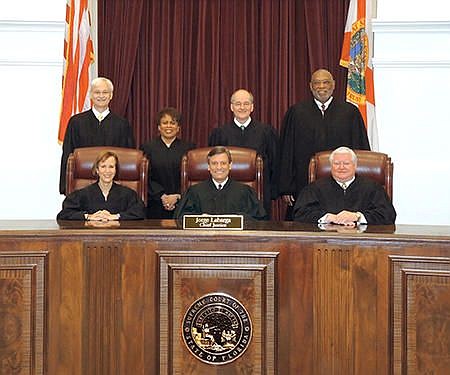
In a medical-malpractice lawsuit stemming from the death of a woman who hanged herself, the Florida Supreme Court on Wednesday weighed whether her doctor could be found negligent in the suicide.
The case, brought by the husband of Sarasota County woman Jacqueline Granicz after her 2008 death, raises issues about physician Joseph Chirillo’s “duty” of care.
The 2nd District Court of Appeal ruled last year that the lawsuit against Chirillo could move forward, overturning a circuit judge’s ruling in the doctor’s favor.
Scott Cole, an attorney for Chirillo, told the Supreme Court that Granicz, 55, had never indicated she might commit suicide and that the hanging death was “not foreseeable.”
“In this particular case, this was a suicide,’’ he said. “This was not a standard medical-negligence case.”
But Justice R. Fred Lewis pointed to scientific advances that have led to greater knowledge about the human mind and psychiatric conditions. He questioned the idea that a suicide cannot be foreseeable.
“Why is that (suicide) such a reserved area?” Lewis asked.
Granicz suffered from depression and called the doctor’s office on Oct. 8, 2008, reporting that she was under mental strain, crying easily and having other problems, according to last year’s appeals-court ruling. After learning about the call from an assistant, Chirillo decided to change Granicz’s medication and refer her to a gastroenterologist for gastrointestinal issues.
The woman’s body was found the next day. The lawsuit alleged that Chirillo breached a duty of care, but a circuit judge granted summary judgment in favor of the doctor.
The appeals court reversed that decision, allowing the lawsuit to move forward and prompting Chirillo to take the issue to the Supreme Court.
After hearing oral arguments, justices typically take months to rule in such cases.
Lewis and other justices repeatedly questioned Cole about distinctions he drew related to the ability of doctors to predict suicides. James Tilghman, an attorney for Granicz’s husband, Robert, argued the lawsuit against Chirillo should be allowed to move forward.
“This is a, ‘You’ve got to treat your patient according to the standard of care’ (case),’’ Tilghman said.
But Cole said Chirillo could not have predicted the suicide.
“There was never an indication that this patient had anything other than distress and stomach issues,’’ he said.